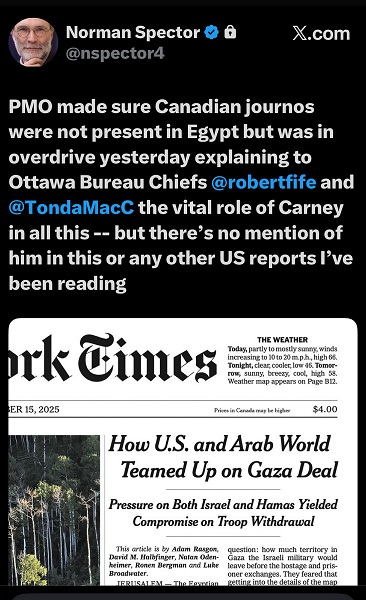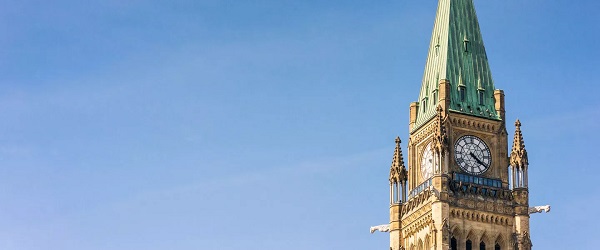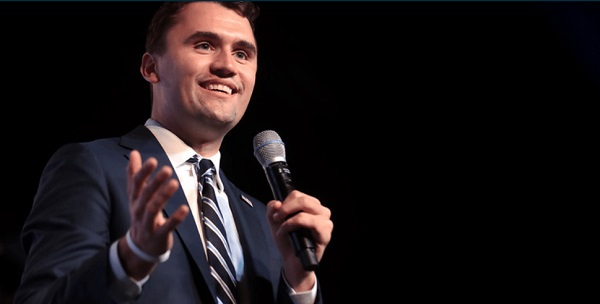Media
Canada’s top Parliamentary reporters easily manipulated by the PMO’s “anonymous sources”

X-post by former PMO chief of staff Norman Spector, who noticed something was up concerning how the Prime Minister’s team got its message out
Press Gallery members denied access to Carney’s Egypt photo opportunity dutifully repeat anonymous, unverified claims elevating the Prime Minister’s importance
Last week, the Parliamentary Press Gallery (PPG) and I had something in common.
We were both dismayed.
They, because they weren’t invited to join Prime Minister Carney on his last-minute trip to Egypt for a photo opp; Me because most of them didn’t seem all that interested in looking into the circumstances of the PM’s hasty departure and instead allowed themselves to be played in the most appallingly obvious manner.
Peter Menzies is a past publisher of the Calgary Herald, a former vice chair of the CRTC and a National Newspaper Award winner.
Subscribe to The Rewrite.
What got the PPG’s knickers twisted was that they weren’t invited to accompany Carney when he departed Ottawa in a rush to get to the Egyptian resort of Sharm El Sheikh, a popular spot on the Red Sea for the world’s glitterati. It took PPG President Mia Rabson a couple of days to issue a statement, but she made it clear the PPG disapproved:
“The Parliamentary Press Gallery was not informed in advance of the Prime Minister’s trip to Egypt to participate in the Middle East Peace Ceremony on Oct. 12 -13,” she wrote. “The Gallery is disappointed and dismayed at the exclusion of Canadian media from the event and expresses in no uncertain terms that this must never happen again.
“It is unprecedented that Canadian media be entirely excluded from a Canadian prime minister’s foreign trip.”
The only reporting I could find on this was in Politico, where it was recorded that the PMO had posted this notice: “6:30 p.m. The Prime Minister will depart for Sharm el-Sheikh, Egypt, to attend the signing of a Middle East peace plan. Closed to media.”
What first caused my jaw to drop and to become, like Rabin, disappointed and dismayed, were the stories left unpursued. On the morning of Oct. 12, Canada was not listed as among the countries invited to join in the “peace summit” associated with the ceasefire deal reached between Israel and Hamas. If it had been, the prime minister may not have had to charter a private jet because the usual Royal Canadian Air Force planes and crews were, as City News’s Glen MacGregor reported, unavailable.
There are two lines of journalistic inquiry there, neither of which appears to have been of interest. The first is: how can Canada’s military be so poorly equipped that there isn’t at all times a fully-equipped aircraft and crew on standby and is this an issue that will be addressed in the future? The second is: how did we wind up getting invited to the peace summit? Comments by US President Donald Trump indicate that we weren’t initially considered important enough to be on site but phoned to ask if we could join the party. (The Line – which doesn’t accept government subsidies – noticed.)
Trump, in remarks to media said: “You have Canada. That’s so great to have, in fact. The president called and he wanted to know if it’s worth – well he knew exactly what it is. He knew the importance. Where’s Canada, by the way? Where are you? He knew the importance of this.”
What was pursued, at least in comments online by journalists, was Trump’s inability to identify Carney by his correct title. (In an exchange that followed, Carney sarcastically thanked Trump for elevating him and, in response, was told “at least I didn’t call you governor.” Ha ha.)
Everyone is free to make their own decisions, but if Canada had to call Trump to ask to be invited, Canadians need to know if that means we are in the president’s debt. Trump, after all, seems like the sort of guy who keeps score.
Readers will notice a new DONATE button has been added.
This allows you to buy The Rewrite a cup of coffee or, if you are feeling generous, wine, but doesn’t constitute a subscription.
Please consider making use of it and help us save journalism from bad journalism.
Share
But it’s what followed that really got creepy. While Canadian reporters were not allowed to accompany the prime minister to Egypt, someone who says he or she was on the plane started phoning around to tell reporters what happened. And they went for it. The Globe and Mail, Toronto Star and Politico all reported unverified statements emanating from a single, unnamed source. The Globe’s Robert Fife reported that “a senior government official” said that while Carney and others thought they were just in Egypt for a photo opp, during a four hour wait for Trump to arrive from Israel “Mr. Carney had back-and-forth conversations with a group of leaders.”
Fife wrote that “The Globe and Mail is not identifying the official so they could speak candidly.”
Tonda MacCharles of the Toronto Star also quoted a “senior Canadian government official” who “spoke confidentially to provide background information on what was discussed at the leaders-only talks.” Said official was buzzing about the dynamism of the occasion and the ever so important role the boss played at the photo opp.
“Imagine the G20 without the talking points and pomp and circumstance. We all came out of it, staffers, like ‘wow that was a useful meeting,’” the anonymous source told MacCharles, whose report, similar to Fife’s, did not indicate that any efforts whatsoever had been made to verify the claims of the “official” with even a second anonymous “official.”
The Globe report expanded on how Carney’s attendance in Egypt was all part of a broader strategy, that he is well-known and liked in the region and how the invitation “was not a surprise” because Carney has “sought” to “act as a go-between Arab states and Washington.”
That doesn’t exactly appear consistent with the source’s concession that Carney’s office “first heard of the invitation on social media” but, whatever.
MacCharles and Fife tried to add greater context to their reports (the former doing the better job, in my view) but while The Free Press’s Rupa Subramanya wondered what all the fuss was about and Brian Mulroney’s former chief of staff Norman Spector (see frame grab above) smelled a rat, my conclusion is that what we have here is unacceptable.
The Prime Minister departed the country unaccompanied by even a single representative of the nation’s press. Upon his return, neither Carney nor any “officials” held a news conference to explain what took place. Instead, targeted media got fed what could be (I’ll use the polite term) pure fantasy. Two of Canada’s leading news organizations, apparently confusing themselves with stenographers, then – and without noting any attempts whatsoever at verification – dutifully passed it all along to their readers on …. faith.
Compare what took place here to what the Associated Press has to say about the use of anonymous sources in politics:
“No one wants news that’s built on unnamed, unaccountable sources and facts seemingly pulled from the air. Politicians and members of the public sometimes have cited such journalism as a reason for the fall in trust in the media….
“Reporting with loose attribution or anonymous sourcing can be dismissed as fake by the skeptical reader or politician. On the other hand, a report filled with verifiable facts attributed to named and authoritative sources of information is impossible to dispute.”
When all was said and done, the coverage of the Prime Minister’s visit to Egypt was denied to journalists and replaced with unchallenged reports from the leader’s staff, just like it’s done in tin pot dictatorships. And not a peep from the nation’s heavily subsidized journalism community.
Not a frickin’ peep.
(Peter Menzies is a commentator and consultant on media, Macdonald-Laurier Institute Senior Fellow, a past publisher of the Calgary Herald, a former vice chair of the CRTC and a National Newspaper Award winner.)
Readers will notice a new DONATE button has been added. This allows you to buy The Rewrite a cup of coffee or, if you are feeling generous, wine, but doesn’t constitute a subscription. Please consider making use of it and help us save journalism from bad journalism.
Subscribe to The Rewrite.
For the full experience, upgrade your subscription.
Business
Federal Budget 2025: A responsible media would ensure Canadians know about the dismal state of federal finance

From the Fraser Institute
By Jake Fuss and Grady Munro
From 2014 to 2024, gross government debt (including federal, provincial and local governments) increased from 85.5 per cent of the economy (measured by GDP) to 110.8 per cent—a larger increase than any other G7 country. When debt grows faster than the economy, government finances are unsustainable.
Ahead of the Carney government’s long-awaited first budget scheduled for Nov. 4, a recent CBC commentary described the long-standing debate about the federal deficit and the state of federal finances as “something of a phoney war.” And that calls to balance the budget—expressed today and over the last decade—have lacked any serious discussion about the trade-offs between allowing deficits to persist versus balancing the budget.
While there’s certainly something to be said about the political theatre that regularly dominates the House of Commons—which we agree focuses too often on scoring political points instead of adequately assessing the merits of policy—it’s wrong to downplay concerns about the state of federal finances. Such concerns aren’t “phoney.”
Consider this. From 2014 to 2024, gross government debt (including federal, provincial and local governments) increased from 85.5 per cent of the economy (measured by GDP) to 110.8 per cent—a larger increase than any other G7 country. And federal gross debt increased from 53.0 per cent of the economy in 2014/15 to a projected 70.0 per cent in 2024/25. When debt grows faster than the economy, government finances are unsustainable. And the Carney government seemingly plans to continue this same approach.
In other words, the government plans to continue to spend more than it collects in revenue, continue to run massive deficits, and continue to rack up large amounts of debt.
Why should Canadians care?
Because the costs of government debt land squarely on their backs. For example, when government debt levels rise, the cost of debt interest often also rises. This year the federal government will spend a projected $54.5 billion on debt interest costs—equivalent to what it sends to the provinces for health care. Moreover, when governments borrow money, they can help drive up the cost of borrowing by increasing demand for the limited pool of savings that both government and the private sector compete for—making it more expensive for a family to take out a mortgage or businesses to attract investments. And to pay for today’s debt accumulation, governments in the future may raise taxes—a burden that will fall disproportionately on younger generations.
Again, given this alarming deterioration in the state of government finances over the last decade and the costs it imposes on Canadians, there’s nothing disingenuous about calling for more fiscal discipline from Ottawa.
Of course, getting federal finances back in order is no small task—the Trudeau government’s forays into areas of provincial jurisdiction (which carry huge price tags), combined with Carney’s massive new spending commitments for defence and other programs, mean the government cannot balance the budget without significant trade-offs. In the past, the federal government has overcome similar fiscal circumstances by committing to balance the budget and outlining a clear plan to achieve this goal. The Carney government should heed these lessons and apply them in its upcoming budget.
Censorship Industrial Complex
Canada’s privacy commissioner says he was not consulted on bill to ban dissidents from internet

From LifeSiteNews
Privacy Commissioner Philippe Dufresne that there was no consultation on Bill C-8, which is touted by Liberals as a way to stop ‘unprecedented cyber-threats.’
Canada’s Privacy Commissioner admitted that he was never consulted on a recent bill introduced by the Liberal government of Prime Minister Mark Carney that became law and would grant officials the power to ban anyone deemed a dissident from accessing the internet.
Privacy Commissioner Philippe Dufresne said last week that in regard to Bill C-8, titled “An Act respecting cyber security, amending the Telecommunications Act and making consequential amendments to other Acts,” that there was no consultation.
“We are not consulted on specific pieces of legislation before they are tabled,” he told the House of Commons ethics committee, adding, “I don’t want privacy to be an obstacle to transparency.”
Bill C-8, which is now in its second reading in the House of Commons, was introduced in June by Minister of Public Safety Gary Anandasangaree and has a provision in which the federal government could stop “any specified person” from accessing the internet.
All that would be needed is the OK from Minister of Industry Mélanie Joly for an individual to be denied internet service.
The federal government under Carney claims that the bill is a way to stop “unprecedented cyber-threats.”
The bill, as written, claims that the government would need the power to cut someone off from the internet, as it could be “necessary to do so to secure the Canadian telecommunications system against any threat, including that of interference, manipulation, disruption, or degradation.”
While questioning Dufresne, Conservative MP Michael Barrett raised concerns that no warrant would be needed for agents to go after those officials who want to be banned from the internet or phone service.
“Without meaningful limits, bills like C-8 can hand the government secret, warrantless powers over Canadians’ communications,” he told the committee, adding the bill, as written is a “serious setback for privacy,” as well as a “setback for democracy.”
Barrett asked if the goal of the bill is for Parliament to be granted “sweeping powers of surveillance to the government without a formal review?
Dufresne said, “It’s not a legal obligation under the Privacy Act.”
Experts have warned that Bill C-8 is flawed and must be “fixed.”
The Canadian Civil Liberties Association (CCLA) blasted the bill as troublesome, saying it needs to “fix” the “dangerous flaws” in the bill before it becomes law.
“Experts and civil society have warned that the legislation would confer ministerial powers that could be used to deliberately or inadvertently compromise the security of encryption standards within telecommunications networks that people, governments, and businesses across Canada rely upon, every day,” the CCLA wrote in a recent press release.
Canada’s own intelligence commissioner has warned that the bill, if passed as is, would potentially not be constitutionally justified, as it would allow for warrantless seizure of a person’s sensitive information.
Since taking power in 2015, the Liberal government has brought forth many new bills that, in effect, censor internet content as well as go after people’s ability to speak their minds.
Recently, Canadian Conservative Party MP Leslyn Lewis blasted another new Liberal “hate crime” bill, calling it a “dangerous” piece of legislation that she says will open the door for authorities to possibly prosecute Canadians’ speech deemed “hateful.”
She also criticized it for being silent regarding rising “Christian hate.”
-

 Red Deer1 day ago
Red Deer1 day agoThe City of Red Deer’s Financial Troubles: Here Are The Candidates I Am Voting For And Why.
-

 Business1 day ago
Business1 day agoUN, Gates Foundation push for digital ID across 50 nations by 2028
-

 COVID-191 day ago
COVID-191 day agoThe Trials of Liberty: What the Truckers Taught Canada About Power and Protest
-

 C2C Journal1 day ago
C2C Journal1 day agoCharlie Kirk and the Fragility of Civic Peace
-

 International22 hours ago
International22 hours agoPoland’s president signs new zero income tax law for parents with two children
-

 Business2 days ago
Business2 days agoFederal Budget 2025: A responsible media would ensure Canadians know about the dismal state of federal finance
-

 Business2 days ago
Business2 days agoCanada has an energy edge, why won’t Ottawa use it?
-

 Automotive22 hours ago
Automotive22 hours ago$15 Billion, Zero Assurances: Stellantis Abandons Brampton as Trudeau-Era Green Deal Collapses





